用于生物医学植入物 Ti64 合金表面改性的新型环保热化学工艺
IF 4.9
2区 化学
Q2 CHEMISTRY, PHYSICAL
Colloids and Surfaces A: Physicochemical and Engineering Aspects
Pub Date : 2024-11-20
DOI:10.1016/j.colsurfa.2024.135806
引用次数: 0
摘要
本研究利用柠檬酸和过氧化氢开发了一种环境友好的新型 Ti64 合金热化学表面改性工艺,以改善其机械性能、生物相容性和生物活性,从而应用于生物医学领域。这种新型工艺是通过热化学方法开发的,然后在 Hanks 平衡盐溶液(HBSS)中进行了模拟矿化。该研究通过评估环保化学品对改性表面的影响以及寻找最佳 pH 值,研究了热化学对表面特性的影响。研究结果表明,与未经处理的 Ti64 合金相比,改性有效提高了 Ti64 合金的机械性能,平均显微硬度显著提高了约 71%,磨损率降低了约 64.29%。用 pH 值(5、7 和 9)对表面进行改性后,其接触角低于 90°,表明表面具有亲水性,可增强细胞对生物材料的附着,从而显示出吸附特性。在 HBSS 中浸泡 Ti64 合金后,形成了约 20.5 μm 的均匀涂层,从而提高了生物活性,其 Ca/P 比值为 1.67,与人体骨骼中的羟基磷灰石相当。pH 值为 7 时的溶血率为 0.027 %,表明红细胞(RBC)溶解很少,这表明生物相容性增强。随着 pH 值(5、7 和 9)的升高,腐蚀速率分别提高了约 1.975 × 10-2、1.078 × 10-2 和 1.615 × 10-2)毫米/年。这些研究结果表明,中性 pH 值(7)的新工艺是表面改性的最佳选择,因为它能最有效地提高 Ti64 合金的生物相容性和生物活性,使其适用于生物医学植入物。本文章由计算机程序翻译,如有差异,请以英文原文为准。
A novel environmentally friendly thermochemical process for Ti64 alloy surface modification for biomedical implants
This study develops an environmentally friendly novel thermochemical surface modification process of Ti64 alloy by utilizing citric acid and hydrogen peroxide to improve the mechanical properties, biocompatibility, and bioactivity for biomedical applications. The novel process was developed thermochemically, followed by simulated mineralization in Hanks Balanced Salt Solution (HBSS). The study investigates the effects of thermochemicals on surface characteristics by evaluating the influence of eco-friendly chemicals on modifying surfaces and finding the optimal pH value. The findings demonstrated that the modification effectively enhanced the Ti64 alloy mechanical properties with a significant increase in average microhardness by approximately 71 % and a reduction in wear rate by approximately 64.29 %, compared to untreated Ti64 alloy. The surface modification with pH (5,7, and 9) revealed absorptive properties as evidenced by a contact angle below 90°, indicating a hydrophilic surface, enhancing cells' attachment to biomaterials. After soaking Ti64 alloy in HBSS, a uniform coating layer of around 20.5 μm formed, leading to increased bioactivity, as evidenced by a Ca/P ratio of 1.67, comparable to hydroxyapatite in human bone. The hemolysis ratio of 0.027 % at pH 7 indicates little red blood cell (RBC) lysis, indicating increased biocompatibility. The corrosion rate was enhanced with pH (5,7, and 9) approximately (1.975 × 10−2, 1.078 × 10−2, and 1.615 × 10−2) mm/year, respectively. These findings indicate that the novel process with neutral pH (7) is optimal for surface modification as it is the most effective in enhancing the biocompatibility and bioactivity of the Ti64 alloy, making it suitable for biomedical implants.
求助全文
通过发布文献求助,成功后即可免费获取论文全文。
去求助
来源期刊
CiteScore
8.70
自引率
9.60%
发文量
2421
审稿时长
56 days
期刊介绍:
Colloids and Surfaces A: Physicochemical and Engineering Aspects is an international journal devoted to the science underlying applications of colloids and interfacial phenomena.
The journal aims at publishing high quality research papers featuring new materials or new insights into the role of colloid and interface science in (for example) food, energy, minerals processing, pharmaceuticals or the environment.

 求助内容:
求助内容: 应助结果提醒方式:
应助结果提醒方式:


